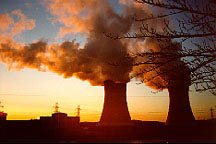Three Mile Island - 20 Years Later

Three Mile Island was the site of America's worst commercial nuclear accident. Today, 20 years after the accident, we'll try to assess its impact on the physical and emotional health of people who live here. And we'll explore how this single event changed the course of the nuclear industry and the nation's energy policy.
Related Links
Published: April 2, 1999
International Proposals For Nuclear Waste Sites
Published: April 2, 1999
Even if nuclear power could be produced without risk of accident and very inexpensively, it would still have a major dilemma: what to do with the radioactive waste.
Nuclear Energy and Climate Change: A Debate
Published: April 2, 1999
Nuclear power was defended and challenged in a formal debate held recently in New York City. We've asked the 2 debaters to summarize their arguments, and here's what they had to say.
Nuke Power: Past and Future
Published: April 2, 1999
Nuclear power is the newest technology to make electricity on a large, commercial scale, and it's probably the most controversial one.
Culture Meltdown
Published: March 26, 1999
Once the immediate danger posed by the accident passed, Three Mile Island became grist for talk show hosts and comedy troupes.
A Resident Reminisces
Published: March 26, 1999
"This little corner of the world has always been a safe and secure haven. The things that happened in the rest of the world did not happen here. And suddenly we were the focus of the entire world. I mean, it was really a change. Forever." -- Bonnie Valentine
TMI Responds
Published: March 26, 1999
With new procedures and safeguards, the odds of another accident at Three Mile Island are extremely low. And so far, only one of many medical studies has been able to point to any lasting health effects. But the credibility of the nuclear industry remains low.
Three Mile Island: 20 Years Later
Published: March 26, 1999
Host Steve Curwood's retrospective report on the day the oil tanker Exxon Valdez ran aground in Alaska's Prince William Sound, spilling 11 million gallons of oil, the largest spill ever in the U.S.
Back to the series and features homepage
Living on Earth wants to hear from you!
Living on Earth
62 Calef Highway, Suite 212
Lee, NH 03861
Telephone: 617-287-4121
E-mail: comments@loe.org
Newsletter [Click here]
Donate to Living on Earth!
Living on Earth is an independent media program and relies entirely on contributions from listeners and institutions supporting public service. Please donate now to preserve an independent environmental voice.
NewsletterLiving on Earth offers a weekly delivery of the show's rundown to your mailbox. Sign up for our newsletter today!
 Sailors For The Sea: Be the change you want to sea.
Sailors For The Sea: Be the change you want to sea.
 The Grantham Foundation for the Protection of the Environment: Committed to protecting and improving the health of the global environment.
The Grantham Foundation for the Protection of the Environment: Committed to protecting and improving the health of the global environment.
 Contribute to Living on Earth and receive, as our gift to you, an archival print of one of Mark Seth Lender's extraordinary wildlife photographs. Follow the link to see Mark's current collection of photographs.
Contribute to Living on Earth and receive, as our gift to you, an archival print of one of Mark Seth Lender's extraordinary wildlife photographs. Follow the link to see Mark's current collection of photographs.
 Buy a signed copy of Mark Seth Lender's book Smeagull the Seagull & support Living on Earth
Buy a signed copy of Mark Seth Lender's book Smeagull the Seagull & support Living on Earth

